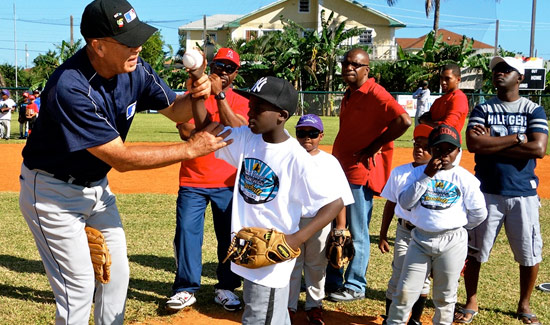 The CARICOM Secretariat has facilitated yet another successful national consultation on youth crime and violence. Among the most prominent presenters at the event was Corporal Lauston Percival, Founder of Operation Future.
The CARICOM Secretariat has facilitated yet another successful national consultation on youth crime and violence. Among the most prominent presenters at the event was Corporal Lauston Percival, Founder of Operation Future.
The two-day consultation which was funded by the United States Agency for International Development (USAID), in partnership with The Bahamas Ministries of National Security and Youth Sports and Culture, opened on Tuesday (Sept. 25) in Nassau, The Bahamas under the theme: Partnering for crime prevention and social development.
It is the fifth in a series of national consultations, organized by the CARICOM Secretariat to engage representatives from the public and private sectors, civil society, academia, affected youth, families and communities in dialogue in order to develop country-specific social interventions and crime prevention strategies to mitigate the alarmingly high incidence of youth crime and violence in the Caribbean Region.
This is just one component of the four-pronged CARICOM Social Development and Crime Prevention Action Plan, which was developed in tandem with the United Nations Office on Drugs and Crime (UNODC).
Youth violence in several Caribbean countries is significantly above the world average and threatens the prosperity of the Region. The national consultation provided an exposé on the enormity of the situation in several Member States, including The Bahamas, Belize, Guyana, St Kitts and Nevis; and as Member States grapple with solutions to what is obviously another development challenge, it is clear that there is no one approach to crime-fighting, but what is even more painfully clear is the challenge of harnessing resources.
At the opening ceremony of the national consultation, The Bahamas Minister of National Security, the Hon. Dr Bernard Nottage pointed to several Reports – including the most recent Caribbean Human Development Report (2012) – which provided empirical evidence on the social determinants of youth crime and violence. These include poverty, inequality in employment and under-employment, the growing economic gap between the rich and the poor, lack of judicious parental guidance and the reluctance to pursue positive opportunities.
He stated that youth violence was an important development challenge worldwide, therefore, “youth development and youth empowerment must be important parts of our citizen security response…”
In the Minister’s estimation “investments in reducing the risk factors associated with violent offending and victimization, coupled with strategies for boosting youth resilience can reduce or even reverse the negative impact of youth violence…” But the Minister emphasized the need for the Caribbean to rethink its approaches to tackling crime and violence and insisted that “… we must address the fundamental social and economic development issues that predispose our youth to crime and violence…”
He asserted that any response to youth crime and violence must address the structural, societal, community and individual risk factors that account for youth violence.” He also stressed the importance of cooperation and partnerships in the successful implementation of any crime fighting strategy.
The latter note struck a positive chord with the USAID representative John W Armstrong, who underscored the importance of partnerships in tackling what he stated was an enormous challenge for both his country and the Caribbean Region.
Mr Armstrong, who is the Charge D’ Affaires at the US Embassy in The Bahamas was very impressed with the multi-disciplinary and multi-sectoral approach adopted by the CARICOM Secretariat in addressing crime prevention in the Region. He was also resolute that the strategies used in combating youth crime and violence must be unique to the context and realities of each region and country because “one size does not fit all.”
The Bahamas Director of Youth, in the Ministry of Youth, Sports and Culture, Darron Turnquest was optimistic that both Regions could work together to put a serious dent in youth crime and violence. He was of the opinion that the punitive justice system that promotes incarceration had not succeeded in preventing youth crime and violence but instead had served to “reinforce a young offenders’ self-image as a failure, increase stress in the family and increase the likelihood that he or she will be placed outside the home in the future.”
“There is no quick fix or easy answers but I am of the opinion that more alternatives to incarceration must be developed…,” he argued.
Mr Turnquest drew on the vision of the newly drafted CARICOM Youth Development Action Plan (CYDAP) to make the point that sound, consistent policies, programmes and laws were necessary but by themselves they were not sufficient in developing “secure valued and empowered adolescents who can realize their full potential and contribute to a sustainable Caribbean Community.”
Mr Turnquest is not off the mark in his suggestions: The much touted World Bank –UNODC 2007 Report titled, ‘Crime, Violence and Development: Trends, Cost and Policy Options in the Caribbean’ indicates that several countries are increasingly investing in crime prevention – using approaches such as integrated citizen security programs, crime prevention through environmental design, and a public health approach that focuses on risk factors for violent behaviors. These alternative approaches, the Report states, have significant potential to generate decreases in both property crime and inter-personal violence.
The Report also recommends that Caribbean policymakers invest in programmes that have been shown to be successful in careful evaluations. These include early childhood development and mentoring programs; interventions to keep high risk youth in secondary schools; and opening schools after hours and on week-ends to offer additional activities and training.
However, crime prevention through social interventions takes time, effort, dialogue, plus a whole lot of resources. The latter is cause for concern to Beverly Reynolds, CARICOM Secretariat Programme Manager for Sustainable Development, who has responsibility for leading the implementation of the CARICOM Social Development and Crime Prevention Action Plan. She pointed to the worrying trends in youth violent gang related crimes particularly in the Region’s schools and lamented the unavailability of sources to address these challenges.
Based on her experience with implementation in four other countries – Belize, Guyana, St Kitts and Nevis and Trinidad and Tobago – workable interventions were being stalled and hope – especially among reformed gang members – evolved into despair because invariably, there is no consistent source of funding to sustain these interventions. She explained that even when funds were identified from International Development Partners, extensive delays in disbursements left the Secretariat with very little time to implement the interventions within the time-frame stipulated by the donor agency.
She urged participants at the national consultation to form partnerships across ministries and with the private sector, NGOS/FBO, youth and community organizations to maximize resources. In addition, she encouraged sharing of best practices, and integrating crime prevention and intervention actions into existing successful programmes. In this way, she explained, projects could transition into sustainable programmes.
In the meantime, the fight continues; and the CARICOM Secretariat is convinced that informed policies at the national, regional and international levels can make a significant difference in crime prevention in the Region. Against this background, the Secretariat is working assiduously with several partners.
What remains to be seen is whether these partnerships will spawn a steady flow of resources absolutely necessary to make the difference that must be made for the sake of the prosperity of our Region.


